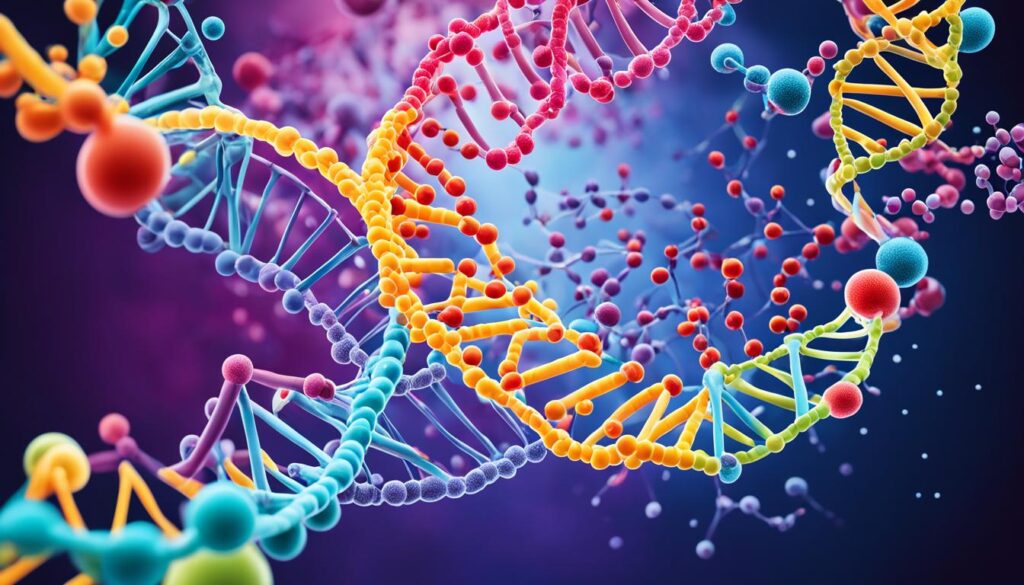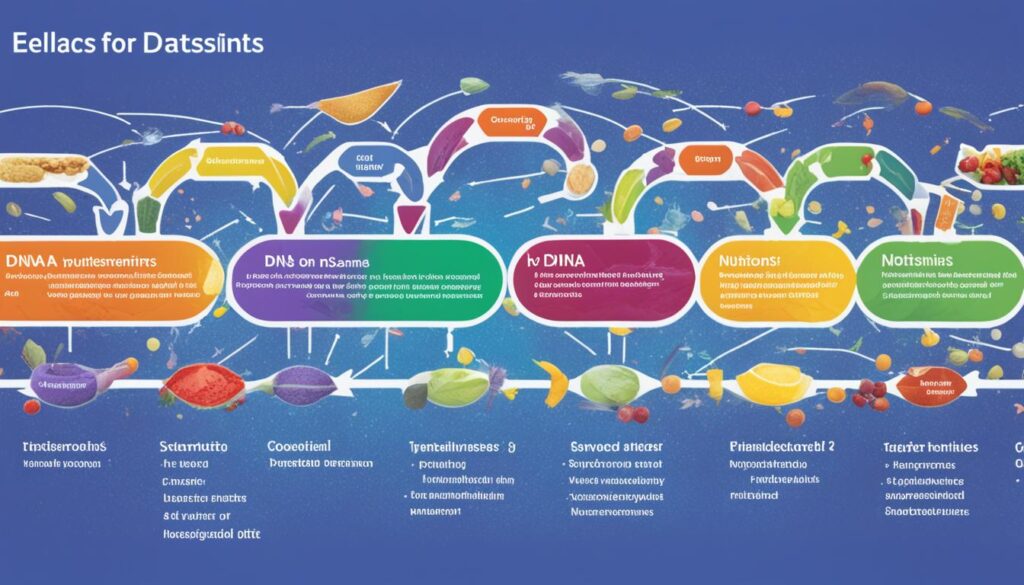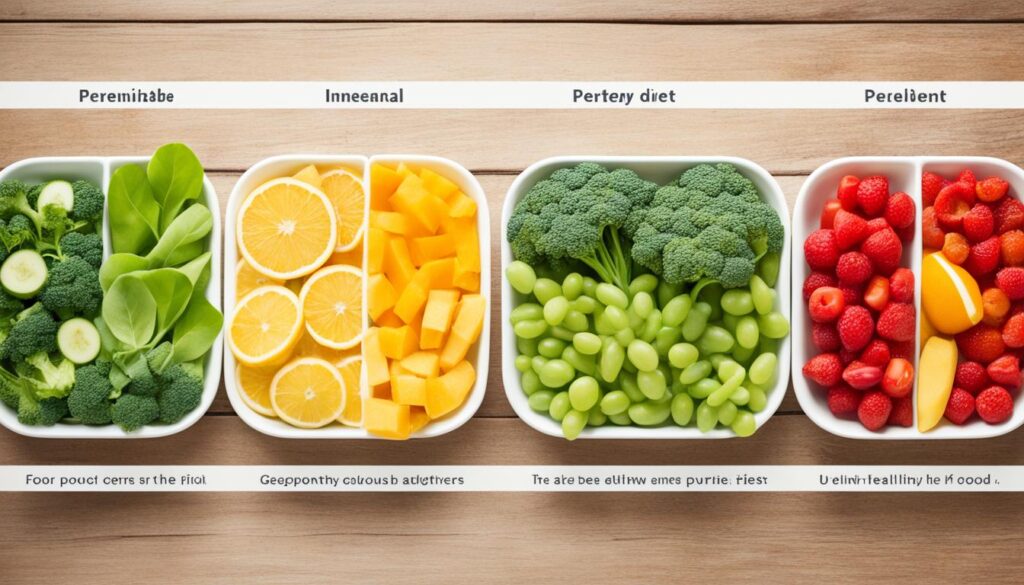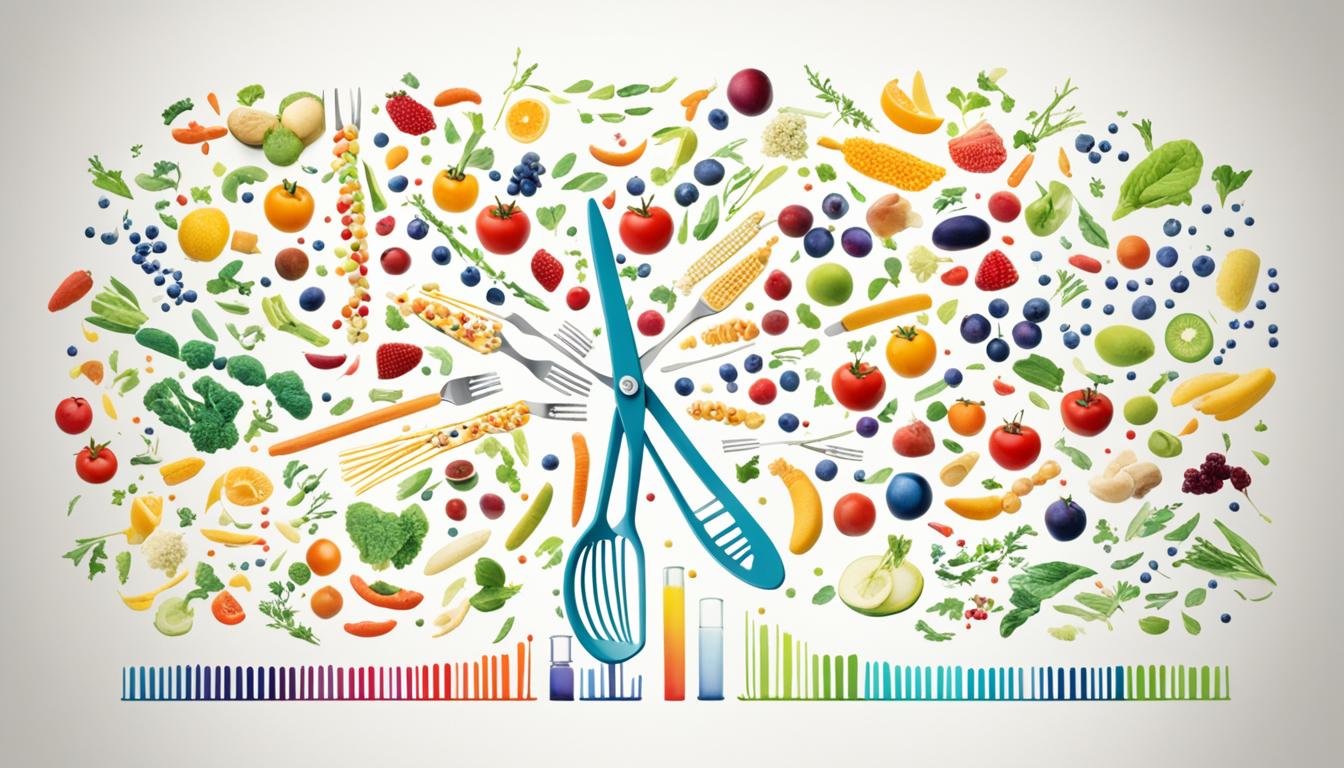“Let food be thy medicine and medicine be thy food.” – Hippocrates
Welcome to our exploration of nutritional epigenetics. In this article, we delve into the fascinating field of how nutrition can influence our genes and ultimately impact our health. Nutritional epigenetics examines the interaction between our diet and gene expression, shedding light on how our food choices can shape our overall well-being. Let’s explore what is the definition of nutritional epigenetics.
Nutritional epigenetics goes beyond traditional genetics by studying how our genes are turned on or off by external factors, particularly our diet. By understanding the complex relationship between nutrition and gene expression, we gain insights into how our food choices can optimize our health and potentially reduce the risk of chronic diseases.
In this article, we will explore the history of nutritional epigenetics, how it works in simple terms, and the intersection of nutrition, genetics, and metabolism. We will also highlight specific foods and nutrients that can shape our epigenome and discuss the practical implications of nutritional epigenetics in dietary recommendations and interventions.
Join us on this journey of discovery as we uncover the incredible power of nutrition to impact our genes and transform our health.
Key Takeaways:
- Nutritional epigenetics explores how diet influences gene expression.
- Our food choices can impact our health and the development of chronic diseases.
- By understanding nutritional epigenetics, we can optimize our diets for better health outcomes.
- Nutritional epigenetics sits at the intersection of nutrition, genetics, and metabolism.
- Specific foods and nutrients can shape our epigenome and influence gene expression.
The Emergence of Nutritional Epigenetics
The field of nutritional epigenetics has emerged relatively recently, but it has its roots in early studies that explored the effects of diet on gene expression. Researchers have long observed that environmental factors, including nutrition, can play a role in influencing gene activity. However, it was not until the late 20th century that the concept of epigenetics gained traction and the specific connection between nutrition and gene expression began to be explored more extensively.
A Brief Historical Perspective
Notable pioneers in the field of nutritional epigenetics include Dr. Randy Jirtle, whose groundbreaking research demonstrated the impact of diet on gene expression in mice. His work paved the way for further investigations into the role of nutrition in epigenetic modifications. Additionally, Dr. Robert Waterland’s studies on the effects of maternal nutrition during pregnancy highlighted how early-life dietary factors can have long-lasting effects on the epigenome.
Over the years, numerous studies have contributed to our understanding of nutritional epigenetics. For instance, the Dutch Hunger Winter study examined the intergenerational effects of prenatal malnutrition on health outcomes, shedding light on how early-life nutritional experiences can shape gene expression patterns for future generations. The Famine-Genomic Imprinting in Humans (FAMINE) study further explored the impact of nutrition during critical windows of development, unveiling the role of epigenetic changes in the context of famine exposure.
Notable Pioneers and Studies
Several noteworthy studies have advanced our knowledge of nutritional epigenetics. The CHARGE (Children’s Health Study) project investigated the associations between prenatal exposure to air pollution and DNA methylation patterns, revealing potential epigenetic mechanisms underlying the health effects of environmental pollutants. Another groundbreaking study, known as the PNAS (Proceedings of the National Academy of Sciences) paper, explored how a high-fat diet affects gene expression, providing insights into the role of nutrition in metabolic disorders like obesity.
In recent years, researchers have made significant progress in uncovering the complex relationship between nutrition, epigenetics, and health outcomes. This growing body of research continues to widen our understanding of how dietary choices can influence gene expression and contribute to the development and prevention of various diseases.
Understanding Nutritional Epigenetics in Simple Terms
Nutritional epigenetics can be understood as the study of how our dietary choices and nutrients can influence our gene expression. It explores the idea that our genes are not fixed entities, but rather can be influenced by external factors, such as the foods we consume.
When we talk about epigenetics, we are referring to the modifications that occur in the structure of our DNA, which can result in changes in gene expression without altering the actual DNA sequence. So, while our genes provide the basic instructions for our bodies, it is the environment, including nutrition, that influences which genes are turned on or off.
When we consume different nutrients in our diet, such as vitamins, minerals, or other bioactive compounds, they can interact with our genes and the proteins involved in regulating gene expression. This interaction can lead to modifications in the structure of our DNA or changes in the way our genes are packaged, ultimately affecting how our genes are expressed or “read” by our cells.
For example, certain nutrients may act as “epigenetic modifiers” by adding or removing chemical groups from our DNA or the proteins associated with gene regulation. These modifications can have long-lasting effects on gene expression, potentially impacting our health and susceptibility to diseases.
Research in nutritional epigenetics has shown that our dietary choices can have profound effects on gene expression and health outcomes. Studies have demonstrated that specific nutrients, such as folate, omega-3 fatty acids, and phytochemicals found in fruits and vegetables, can influence gene expression patterns associated with inflammation, oxidative stress, and other cellular processes.
Understanding nutritional epigenetics can empower us to make informed choices about our diets and overall lifestyle. By focusing on a nutrient-rich and balanced diet, we can potentially optimize our gene expression patterns and reduce the risk of chronic diseases.
Intersection of Nutrition, Genetics, and Metabolism
Nutritional epigenetics explores the fascinating intersection of nutrition, genetics, and metabolism. It delves into the intricate relationship between our dietary choices and the function of our genes, as well as the overall metabolic processes within our bodies. Our genes play a fundamental role in determining our health and well-being, and nutrition has the power to influence gene expression and impact our overall genomic function.
Research has shown that dietary choices can have profound effects on the expression of our genes. Certain nutrients can activate or suppress specific genes, while others can alter the epigenetic markers that regulate gene activity. For example, studies have revealed that high-fat diets can lead to the silencing of genes associated with metabolic processes, potentially contributing to conditions like obesity and insulin resistance.
By understanding how nutrition affects genetics and metabolism, we can make informed dietary choices that promote optimal gene expression and metabolic function. With this knowledge, we can harness the power of nutrition to optimize our health and reduce the risk of chronic diseases. It’s important to note that the relationship between nutrition, genetics, and metabolism is complex and multifaceted, and ongoing research is essential to unraveling its intricacies.

Nutritional Epigenetics: Foods and Nutrients That Shape Our Epigenome
Nutritional epigenetics explores the fascinating role that specific foods and nutrients play in shaping our epigenome. The epigenome refers to the overall pattern of epigenetic modifications in our DNA, which can influence gene expression and ultimately impact our health outcomes.
Research has shown that certain foods and nutrients have the ability to influence gene expression through epigenetic mechanisms. These dietary factors can either promote or inhibit the expression of certain genes, thus affecting various physiological processes in our bodies.
For example, some nutrients have been found to enhance DNA methylation, a process that can silence the expression of certain genes. Others may influence histone modifications, which can either loosen or tighten the packaging of DNA, making it more or less accessible to transcription factors.
So, which foods and nutrients have been identified as key players in nutritional epigenetics? Let’s take a closer look:
“The foods we consume act as signaling molecules that communicate with our genes.”
1. Cruciferous vegetables: Vegetables like broccoli, cauliflower, and Brussels sprouts contain compounds called isothiocyanates that have been found to influence gene expression through epigenetic modifications. These compounds have been associated with anti-cancer effects and may help protect against certain types of cancer.

2. Omega-3 fatty acids: Found in fatty fish, walnuts, and flaxseeds, omega-3 fatty acids have been shown to affect gene expression and promote healthy brain function. They may also have anti-inflammatory effects and contribute to heart health.
3. Green tea: The polyphenols found in green tea, particularly epigallocatechin-3-gallate (EGCG), have been shown to have epigenetic effects. They can modulate gene expression and have been associated with various health benefits, including reduced risk of cardiovascular disease and certain types of cancer.
4. Curcumin: This compound, found in turmeric, has been studied for its potential anti-inflammatory and anti-cancer properties. Research suggests that curcumin may influence gene expression through epigenetic modifications, offering potential health benefits.
These are just a few examples of the many foods and nutrients that have been found to affect gene expression through epigenetic mechanisms. By understanding the connection between nutrition and epigenetics, we can make informed dietary choices that support optimal gene expression and overall health.
From Research to Plate: Empirical Evidence and Diet Recommendations
Nutritional epigenetics has provided valuable empirical evidence that demonstrates the link between dietary choices and epigenetic modifications. Through rigorous scientific research, we have gained insights into how nutrition plays a pivotal role in modulating gene expression and shaping our overall health.
Nutrition’s Role in Epigenetic Modification
Epigenetic modifications are heritable changes in gene expression that do not involve alterations in the DNA sequence. These modifications can be influenced by various external factors, including nutrition. The field of nutritional epigenetics has uncovered how specific nutrients and bioactive compounds found in our diet can directly impact epigenetic mechanisms, leading to changes in gene expression.
Research has shown that certain dietary components, such as methyl donors, polyphenols, and micronutrients, can act as epigenetic regulators. For example, folate, a B-vitamin found in leafy greens, plays a crucial role in DNA methylation, a key epigenetic modification. By providing the necessary methyl groups, folate supports proper gene silencing and activation, influencing the risk of developing certain diseases.
Furthermore, studies have linked dietary patterns, such as the Mediterranean diet or the DASH (Dietary Approaches to Stop Hypertension) diet, to favorable epigenetic profiles and improved health outcomes. These findings highlight the significant impact nutrition can have on epigenetic modifications and gene expression.
Shaping Health Through Nutritional Interventions
The practical implications of nutritional epigenetics are vast and extend beyond understanding the science. Applying this knowledge to everyday life can empower individuals to make informed dietary choices that promote optimal gene expression and overall health.
Based on empirical evidence, diet recommendations can be tailored to target specific epigenetic modifications and mitigate the risk of developing chronic diseases. For instance, individuals with a family history of cardiovascular disease may benefit from a diet rich in omega-3 fatty acids, which have been shown to regulate gene expression related to heart health.
Moreover, nutritional interventions can be utilized in various stages of life, from prenatal development to the elderly population. Pregnant women can optimize their child’s health by consuming a balanced diet that supports proper epigenetic programming. Similarly, older adults can make dietary choices that promote healthy aging and reduce the risk of age-related diseases.

By translating empirical evidence into practical dietary recommendations, we can harness the power of nutritional epigenetics to shape our health and well-being. Embracing a personalized approach to nutrition that considers the individual’s genetic makeup and epigenetic profile allows us to optimize our diet for long-term health benefits.
Nutritional Epigenetics and Health Across the Lifespan
Thriving in the Womb: Epigenetic Foundations of Development
Nutritional epigenetics has profound implications for prenatal health and development. During pregnancy, a mother’s diet can directly affect the epigenetic marks on the genes of her developing baby. Studies have shown that certain dietary factors, such as inadequate folate intake or exposure to environmental toxins, can result in epigenetic modifications that increase the risk of diseases later in life.

For example, studies have found that maternal dietary supplementation with folic acid, a B vitamin, can prevent or reduce the risk of neural tube defects in newborns. This is believed to be due to folic acid’s ability to support proper DNA methylation, an important epigenetic mechanism that regulates gene expression. Additionally, studies have shown that maternal obesity and a high-fat diet during pregnancy can lead to epigenetic changes in the offspring, increasing their susceptibility to obesity, diabetes, and other metabolic disorders later in life.
The findings highlight the crucial role of proper nutrition during pregnancy in establishing a favorable epigenetic environment for the developing fetus. By optimizing maternal nutrition, we can potentially reduce the risk of adverse health outcomes in the offspring.
Sustaining Health through Dietary Epigenetics
The impact of nutrition on epigenetic processes extends beyond the prenatal period. Throughout our lives, our dietary choices can continue to influence our epigenome and, consequently, our health outcomes.
Dietary interventions, such as adopting a balanced and nutrient-rich diet, have been shown to have positive effects on gene expression and overall health. For instance, a diet rich in fruits, vegetables, whole grains, and lean proteins has been associated with lower rates of chronic diseases, including cardiovascular disease, cancer, and neurodegenerative disorders.
Emerging research also suggests that certain bioactive compounds found in foods, such as polyphenols and omega-3 fatty acids, may have direct epigenetic effects. These compounds can modulate gene expression and potentially modify our risk for diseases. Regular consumption of these foods can help maintain optimal epigenetic patterns and support overall health.
To sustain health through dietary epigenetics, it is important to maintain a well-balanced, diverse, and nutrient-dense diet throughout life. By doing so, we can positively influence our epigenetic profiles and reduce the risk of chronic diseases.
Table: The Role of Nutrition in Epigenetic Regulation
| Nutrient | Epigenetic Mechanism | Food Sources |
|---|---|---|
| Folate | DNA methylation | Leafy greens, legumes, fortified grains |
| Omega-3 fatty acids | Histone modifications | Fatty fish, flaxseeds, chia seeds, walnuts |
| Antioxidants (e.g., vitamins A, C, E) | Epigenetic modifications of genes involved in oxidative stress | Colorful fruits and vegetables, nuts, seeds |
| Resveratrol | Activation of sirtuins | Red grapes, peanuts |
| Sulforaphane | Induction of detoxification enzymes | Cruciferous vegetables (e.g., broccoli, cabbage, kale) |
Table: The Role of Nutrition in Epigenetic Regulation
The role of nutrition in epigenetic regulation is complex and involves various pathways and mechanisms. The table above provides an overview of some key nutrients and their associated epigenetic mechanisms, as well as food sources rich in these nutrients. By including a wide variety of these nutrient-rich foods in our diets, we can support a healthy epigenetic landscape and promote optimal gene expression.
Conclusion
Nutritional epigenetics is a fascinating field that delves into the intricate interplay between nutrition, genetics, and gene expression. Through extensive research, we now understand that our dietary choices have the potential to impact our epigenome, which in turn can influence our overall health and well-being. This knowledge empowers us to make informed dietary decisions that can optimize our gene expression and reduce the risk of chronic diseases.
By exploring the complex relationship between nutrition and gene expression, nutritional epigenetics opens up a world of possibilities for personalized nutrition plans and interventions. It allows us to explore how specific foods and nutrients can shape our epigenome, leading to targeted dietary recommendations tailored to individual needs.
In conclusion, nutritional epigenetics offers valuable insights into the impact of nutrition on our genes. By understanding how our dietary choices can affect our gene expression, we have the power to take control of our health and well-being. With continued research and application, the field of nutritional epigenetics holds the promise of revolutionizing personalized nutrition and empowering us to lead healthier lives.
FAQ
What is the definition of nutritional epigenetics?
What does epigenetics mean in nutrition?
What is the definition of nutritional epigenetics in simple terms?
How does nutrition affect epigenetics?
What kinds of foods or nutrients can affect your epigenome?
What is an “empty calorie”?
How does an epigenetic diet work?
How does exercise influence epigenetics?
What is the significance of nutritional epigenetics in maintaining optimal health?
What is the impact of nutritional epigenetics on prenatal development?
Source Links
- https://www.ncbi.nlm.nih.gov/pmc/articles/PMC3500842/
- https://en.wikipedia.org/wiki/Nutritional_epigenetics
- https://sph.umich.edu/pursuit/2017posts/nutritional-epigenetics.html




